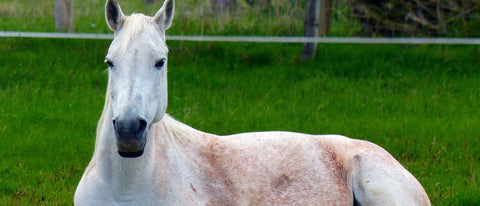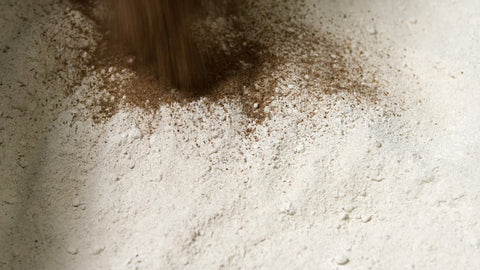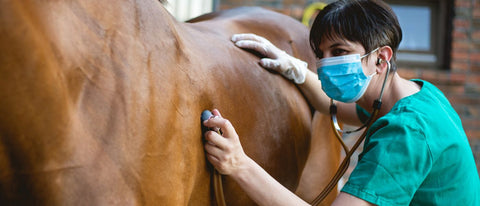
Florian ist aufgewachsen auf einem Bauernhof. Umgeben von Pferden, entdeckte er früh seine Faszination für diese majestätischen Tiere. Inspiriert von seiner reitbegeisterten Mutter, entwickelte er das Nahrungsergänzungmittel - Pferdegold. Seine tiefe Verbundenheit zur Natur und die leidenschaftliche Hingabe zu Pferden trieben ihn an, sein Unternehmen zu gründen.
The sleeping behavior of horses differs significantly from that of other mammals. Horses are naturally flight animals. In the wild, they would have to be constantly on guard against predators, which is why they still instinctively avoid sleeping in unsafe places.
Horses generally sleep polyphasic , dividing their sleep, whether standing or lying down, into several short phases during the day and night. But how do horses sleep in detail, and what is important for them to feel comfortable and safe? We'll explain that here.
This is how long horses sleep on average per day
On average, horses sleep three to five hours per day . But how long do horses actually sleep at a time? This varies greatly, but these few hours are usually spread out into shorter intervals. Horses don't just sleep, they also doze for a few hours.
They are in a kind of intermediate state between waking and sleeping . Of course, the daily sleep requirement of a domestic horse is quite variable, depending
- Character,
- habits,
- digestion
- and feed intake.

Different types of sleep in horses in focus
The sleep phases of the horse are sometimes indistinguishable from one another purely visually:
-
Dozing: When a horse is in a state between waking and sleeping, it is called dozing. This is considered a precursor to SWS, and the horse owner cannot visually determine which of the two states the animal is currently in.
-
SWS sleep: When the animal's heart rate and breathing rate slow, the brain also enters a kind of inactive state. During SWS (slow wave sleep), the head drops significantly, and the eyes are closed or still half-open. During this sleep phase, the horse stands and automatically alternates the weight on its hind legs.
Although horses are essentially asleep during the SWS sleep phase , they are still in a state of alert. They wake up at the slightest noise.
If a horse is feeling particularly comfortable, it may also lie down during the SWS sleep phase. However, the exact position is irrelevant – unlike the REM phase .
-
REM sleep: As in humans, the deep sleep phase in horses is also called REM (Rapid Eye Movement). During this phase, the brain is very active, but breathing and circulation slow down . The horse's eyes are normally completely closed, but they may twitch restlessly, hence the special name.
Horses cannot enter REM sleep without a prior SWS phase. What's special about this is that they can only enter deep sleep while lying on their sides. This also allows the animal's muscles to recover.

Pferdegold® supplementary feed!
Pferdegold is a small family business from Bavaria with a big dream: to produce the best horse feed. We see ourselves as a family of equestrians who want to provide your horse with the ideal nutrition. 100% natural and perfectly tailored to your horse's needs.
Try it now!Standing or lying down: How does a horse sleep?
When you look at a sleeping horse, you can't always immediately tell which sleep phase the animal is currently in. If the horse is just dozing or in the SWS sleep phase , then horses sleep standing up.
When people sleep, all their muscles relax , causing us to fall over. A horse, however, stands stably thanks to its ligaments and tendons.
If the animal is lying on its stomach on the ground , this could also be the SWS phase . However, a horse that is properly asleep in the deep sleep phase must always lie on its side on the ground.
The legs are stretched out. Only then is true, deep sleep possible. Even then, however, they usually only sleep soundly for a few minutes, alternating with lighter sleep phases.

Foals vs. seniors: These are the differences in sleeping behavior
When your horse is fully grown , it usually sleeps around three to five hours a day . They also doze for about another three and a half hours. This means that adult horses usually rest around seven hours.
In foals and young horses, however, the need for sleep can be significantly higher. The little ones usually sleep around ten hours with their mother . Fillies lie in their side positions for almost twice as long as colts.
For seniors, however, the situation is reversed. Due to possible discomfort, some are reluctant to lie on the floor, as getting up can be painful and even strenuous.
However, since even older horses can only reach the REM phase and get their deep sleep when lying down, they need to be particularly considerate of their sleeping place.

These factors can affect horses’ sleep
In order for horses to feel comfortable and be willing to lie down to get their deep sleep, several factors are important:
-
Safety: A horse's sense of safety is paramount. The animal will only lie down for REM sleep when it feels safe and comfortable. Stress or insecurity are therefore the most significant factors influencing sleep.
-
Herd: When the horse is surrounded by a larger and stable herd, the animals usually instinctively take turns sleeping so that all horses get enough rest.
-
Environment: As mentioned, the environment plays a major role. Especially in busy stables or where there are frequent, sudden noises, horses have difficulty falling asleep or may not even lie down at all.
-
Surface: Horses prefer soft surfaces like straw or sand to lie down on for proper sleep. Hard or uneven surfaces can pose significant problems, especially for seniors.
-
Health: If your pet's health is compromised, it may be reluctant to lie on the floor. This can lead to sleep deprivation.
-
Space: The space must be large enough for horses to lie down and stand up comfortably. This can be particularly difficult in cramped stables, resulting in less REM sleep for the animals.
-
Weather: Horses' sleeping behavior is also influenced by the weather. For example, they are less likely to lie down on the ground when it's very cold or very hot.
-
Digestion: The times at which horses are fed and the amount of feed influence the horse's digestion and thus also its nighttime sleep rhythm.
- Daylight: Horses often adapt to the natural light cycle. This means they sleep more often at night and tend to take shorter rest periods and doze more during the day.

Pferdegold® supplementary feed!
Pferdegold is a small family business from Bavaria with a big dream: to produce the best horse feed. We see ourselves as a family of equestrians who want to provide your horse with the ideal nutrition. 100% natural and perfectly tailored to your horse's needs.
Try it now!With these tips you can support your horse’s nighttime rest
If you want to make it as easy as possible for your horse to get into the important REM sleep and be rested, we have some tips for you:
🐎 Provide a safe and quiet environment where your horse can relax and lie down.
🐎 Also make sure that the animal has enough space so that it can lie down and stand up comfortably (especially in the crate).
🐎 Use bedding such as straw or shavings to make the resting area as comfortable as possible for your horse. This is especially important for older horses.
🐎 Make sure that the stable or paddock is quiet during the night so that your horse can relax and is not startled by unfamiliar or sudden noises.
🐎 Horses appreciate a set routine . You can encourage your animal's relaxation by maintaining regular feeding and rest times.
🐎 Many animals respond positively to the presence of other animals of their own kind . This often gives them a greater sense of security and reduces stress.
🐎 Ensure the temperature is appropriate and the stall is well ventilated. It shouldn't be too cold or too hot. Heat stress, in particular, can even lead to respiratory problems.
🐎 Sufficient exercise during the day often ensures that your horse is tired in the evening and finds it easier to sleep.
Our product recommendation
Typical behavior of horses at night
Horses spend a lot of time standing during lighter sleep phases . Thanks to their tensioning mechanism, they can relax and avoid falling over. While dozing , horses rest at night or during the day but remain alert for potential dangers.
Horses sleeping on their sides on the ground with their legs stretched out are usually in the REM sleep phase. They need this deep sleep to avoid sleep deprivation.
In addition, horses eat and defecate at night . Their digestive system works continuously, so they defecate approximately every 90 to 180 minutes, even at night. Horses generally remain very alert, even at night.
They listen to sounds in their environment and react quickly to anything unusual. Therefore, they constantly alternate between periods of rest and alertness at night to preserve their instincts.
That’s why horses need sufficient food even at night
Horses' stomachs are generally very small and designed for frequent feeding throughout the day. They may also get up at night and eat hay or grass before going back to bed.
Conclusion
Horses' sleeping behavior is strongly influenced by their instincts as flight animals. They alternate between dozing while standing and short periods of lying down to obtain important REM sleep. This deep sleep is extremely important for recovery, but horses only lie down when they feel absolutely safe.
Even at night, horses usually remain alert, listening to the sounds in their environment and alternating between periods of wakefulness and rest.
- Scrub,
- Rolling,
- Eat
- and apples also often contribute to their night cycle.
Exercise, a safe environment and healthy digestion also have a positive influence on horses’ sleeping behavior.

FAQ
Can horses dream while sleeping?
Yes, horses dream during REM sleep, but this can only be achieved while lying down. During this phase, horses also display typical signs such as twitching or moving their legs.
Is it normal for horses not to lie down to sleep?
Yes, horses often sleep standing up, as their musculoskeletal system keeps them stable. However, for important REM sleep, they need to lie down, which they only do when they feel safe.
How often does a horse defecate at night?
A horse can defecate approximately one to three times a night, depending on feed intake, digestion and individual habits.
Important:
Pferdegold is not a substitute for veterinary diagnosis or treatment. The information contained in this article is for general informational purposes only and is intended to help improve your horse's well-being.
Pferdegold products do not treat or cure diseases , but rather support your horse in compensating for nutritional deficiencies through targeted nutrient intake .
However, they are not a substitute for professional advice from a veterinarian or specialist. If your horse has any health problems, we strongly recommend consulting a veterinarian. Pferdegold assumes no liability for decisions made based on the information provided here.
🐎 Learn more about horse health:

















